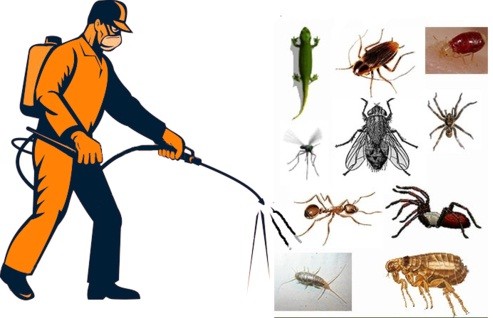Premier Pest Control Near Me: Say Goodbye to Pests
Wiki Article
a thorough self-help guide to various Types of Pest Control techniques
Pest control management is an important facet of preserving a healthy and balanced and livable atmosphere, be it within houses, home gardens, or workplaces. Using the myriad of pest control techniques offered, it could be overwhelming to obtain the best solution for a specific pest problem. From chemical and biological ways to bodily and all-natural options, each strategy possesses its own special talents and restrictions. In this comprehensive tips guide, we will check out these distinct pest control management practices, supplying ideas within their programs and advantages. By the end, you have a clearer comprehension of which approach will be the most readily useful complement your own pest control requirements. Thus, let us plunge into the interesting field of pest control management and uncover the tips for a pest-free environment.Chemical Pest Control Management Techniques

One common variety of substance pest control management is actually insecticides. Insecticides are chemical substances being specifically created to kill or repel bugs. They may be applied in various forms, like sprays, baits, or dusts. Pesticides target particular bugs, instance mosquitoes, termites, or ants, and may be utilized both indoors and outdoors.
Another type of substance pest control management is rodenticides. These are typically substances built to get a grip on populations of rats or rodents, such rats and rats. Rodenticides are generally used in lure kind, which appeals to the rodents then kills them after intake. They have been commonly used in farming options, as well as in domestic and commercial structures.
Weed killers, often referred to as herbicides, tend to be another kind of chemical pest control management technique. Herbicides are created to selectively eliminate unwelcome plants, referred to as weeds, without producing injury to attractive plants. They are commonly used in agriculture, landscaping, and farming to manage the rise of undesirable plant life.
While chemical pest control management methods tends to be impressive in eliminating insects, it is very important use them judiciously and follow security directions. Overuse or misuse of chemical pesticides or herbicides can have bad effects on peoples health and the environmental surroundings - Pest control near me. Consequently, it is very important to hire these processes responsibly and give consideration to alternative pest control strategies whenever you can
Biological Pest Control Management Methods
Biological pest control management practices include the aid of residing bacteria or all-natural substances to manage and manage pest populations. Unlike chemical strategies, which regularly use artificial pesticides or herbicides, biological control methods make use of the organic enemies of insects to manage their unique communities. This process represents much more green and renewable, whilst decreases the usage of harmful chemical substances and reduces the risk of pesticide opposition.One popular biological pest control technique is the development of normal predators or parasites. Eg, ladybugs are introduced to regulate aphids, while particular wasp species are released to a target caterpillars. These predators and parasites feed on insects, lowering their figures and preventing infestations.
Another biological control technique is the application of pathogens. Particular germs, viruses, and fungi may be employed to infect and eliminate specific insects. As an instance, the bacterium Bacillus thuringiensis is often used to get a grip on caterpillars, because it generates toxins being deadly these types of bugs.
Biological control practices also can entail the use of pheromones or organic compounds that disrupt the mating designs of insects. Pest try this web-site control near me. By interfering with their own copy, these methods help lower pest populations over the years
While biological pest control strategies are often effective, they might require longer intervals to realize desired results when compared to chemical methods. Also, consideration must certanly be provided to the this post choice and launch of natural enemies to avoid unintended problems for beneficial bacteria or ecosystems.
Bodily Pest Control Management Methods
To effectively handle and get a handle on bug populations, alternative pest control management practices titled actual pest control methods are used. These procedures involve making use of bodily barriers, traps, or units to avoid pests from being able to access or damaging house. One common real pest control technique is the use of screens or nets to keep bugs from structures or gardens. These screens are generally made from fine mesh content that enables for air flow while avoiding bugs from getting into. Another bodily pest control management method is the installation of walls or walls to help keep bigger insects, eg deer or rabbits, from landscapes or farming industries. These barriers physically stop the insects' usage of place, reducing the possibility of damage. Furthermore, traps and products could be used to record or repel insects. For instance, sticky traps can be placed in areas where bugs are a problem, plus the bugs become caught towards the adhesive area. Ultrasonic units can also be used to emit high-frequency sounds which are unpleasant to insects, leading to them to keep the area. Physical pest control management practices tend to be an environmentally friendly replacement for compound pesticides, because they don't count on the effective use of harmful chemicals.
All-natural Pest Control Techniques
Normal pest control methods provide a lasting and green method of managing and eliminating insects. These procedures prioritize the aid of organic materials and biological agents, reducing the need for substance pesticides that harm the environment and human being wellness. Probably one of the most usual normal pest control management practices is biological control. This calls for adding natural predators or parasitic organisms to victimize or parasitize the insects. Including, ladybugs are often launched to home gardens to regulate aphid populations. Another all-natural method is the usage of repellents produced by flowers. Specific flowers, such as for instance marigolds, lavender, and peppermint, emit scents that repel bugs like mosquitoes, flies, and ants. Also, social control methods can be used to avoid and handle bug infestations. This includes appropriate sanitation, regular maintenance, and promoting biodiversity within the yard. For example, turning plants, eliminating yard dust, and stimulating normal predators can help prevent the accumulation of insects. By following these all-natural pest control management methods, people and communities can efficiently control insects while minimizing the negative impacts regarding ecosystem and individual health.Incorporated Pest Management (IPM)
Integrated Pest control (IPM) is actually an extensive and systematic approach to pest control management that mixes numerous strategies and methods to efficiently manage insects while reducing the usage of substance pesticides or herbicides. IPM aims to preserve bug populations underneath the economic damage degree through the use of a combination of social, biological, and chemical control practices.Social control strategies include changing the environment to really make it less advantageous for bugs. This could possibly add techniques eg crop rotation, proper sanitation, while the use of resistant place varieties. By producing unfavorable circumstances for pests, social control methods can notably lower pest communities.
Biological control methods involve the effective use of natural enemies, such predators, this hyperlink parasitic organisms, and pathogens, to regulate pests. These normal foes assist regulate bug populations by feeding on or infecting them. By exposing and boosting populations of beneficial organisms, biological control practices can successfully control bugs.
Chemical control practices are utilized as a last resort in IPM. They involve the targeted and judicious utilization of pesticides or herbicides to handle bug communities. Unlike traditional pest control methods, IPM will lessen the employment of chemical pesticides by employing alternate methods.

Summation
Lastly, this information has furnished a thorough summary of the many kinds of pest control management practices. It mentioned chemical, biological, physical, and organic pest control management techniques, as well as the incorporated pest control approach. By comprehending these different methods, individuals can make aware choices which pest control technique is most suitable with regards to their particular needs and tastes. Excellent pest control is essential in sustaining proper and pest-free ecosystem.Report this wiki page